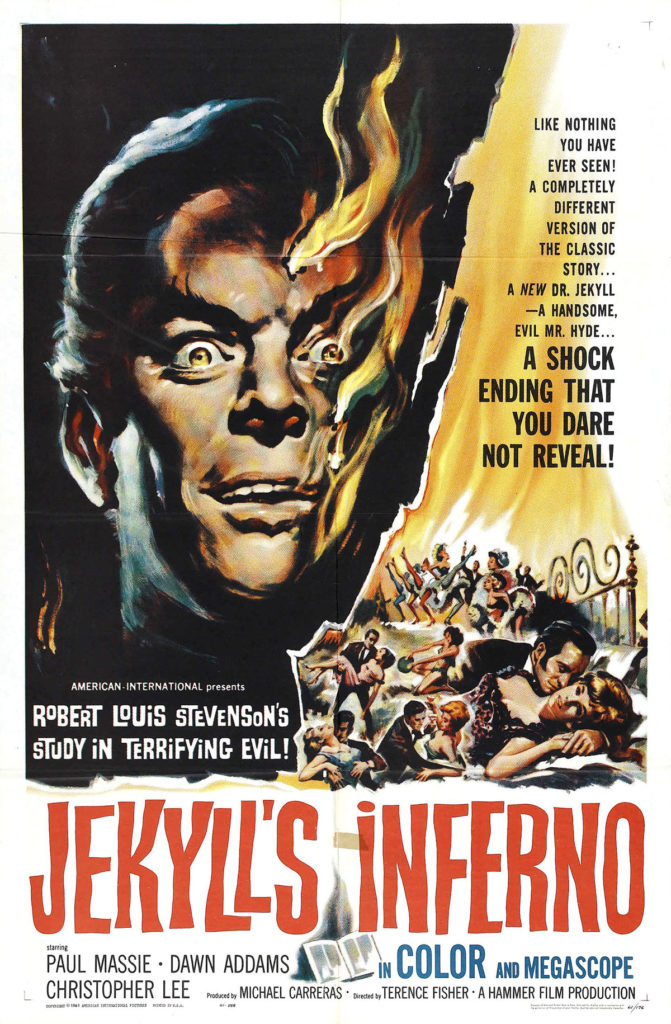Before I began watching The Two Faces of Dr. Jekyll, I thought that the film was probably going to be analogous to one of Hammer’s Frankenstein films, only the monster and his creator never share screen time. If one were to describe this film with broad strokes, such a description is accurate, to a point. Hammer horror films are all kin to one another. They were made quickly, cheaply, and often back to back. Developing an overarching style that applies from one film to the next was an outgrowth of that. So, yes, The Two Faces of Dr. Jekyll does bear similarity to any of the Frankenstein films, as do those films to the Dracula films, et cetera, et cetera. It’s in the details where each of these films, including today’s entry, are given the opportunity to stand out.
From 1960, The Two Faces of Dr. Jekyll was directed by Terence Fisher (who has cemented his place by this point as my favorite Hammer director) from a script by Wolf Mankowitz.
In Victorian London, Dr. Henry Jekyll (Paul Massie, in very bad makeup) is convinced that there is a hidden area of the human mind. He hopes to bring that part to the surface as a means of treating different maladies of the brain. Jekyll is pushing himself hard. He has developed an experimental serum that he believes is the answer, and is willing to try it on himself to prove its worth.
Meanwhile, Jekyll’s wife Kitty (Dawn Addams), and his best friend Paul Allen (Christopher Lee), are having an affair. This isn’t some fly by night thing, either. Paul, despite being an aristocratic gadabout, is deeply in love with Kitty, and she returns his affections in kind. This betrayal doesn’t seem to bother them so much as Paul’s dependence on loans from his friend to cover his gambling debts.
Where Paul and Kitty enjoy going out into the London eve, Jekyll prefers locking himself in his laboratory and brooding over his experiments, torturing himself at his failures.  But all that is about to change. After Jekyll shoots himself up with his new serum, he undergoes a change into Edward Hyde (also Massie, only without the awful makeup).
But all that is about to change. After Jekyll shoots himself up with his new serum, he undergoes a change into Edward Hyde (also Massie, only without the awful makeup).
Hyde is a sociopath. He’s still upper crust, in all the ways that annoy, but the experience is something new for him. When he goes to the same places as Paul and Kitty, he’s like a child visiting the zoo for the first time, eyes wide and boggled with sensory overload. The nightlife grabs hold of him, feeding his animalism. He befriends Paul and Kitty, the two never suspecting that Jekyll is in this new friend of theirs, fighting to escape. Hyde’s appetites are large. Drink, women, drugs, fighting, gambling — all the best vices he embraces with gusto, taking Paul along on a couple outings that would have made Keith Richards sit up and take notice.
Hyde’s boundless enthusiasm for shenanigans takes its toll on Paul and Kitty, and they both seek to escape his influence. Meanwhile, Jekyll has lost control of his other self. He knows Hyde is wreaking havoc on the lives of his loved ones, but he doesn’t know what to do. All this leads to a very satisfying denouement and finale. From a plot perspective, this film is quite good, as is the acting.
Massie is fun in the lead, at least when he plays Hyde. His turn as Jekyll is marred by the poor makeup (something exasperatingly common in Hammer films), and an artificially deepened voice. These types of effects one would normally expect to be applied to the monster of the film, but Fisher switched things up. That’s good for us viewers in one way, at least. Hyde has much more screen time than Jekyll, and it would have been a burden to the film had his appearances been marred by these weak effects. Either way, when the dour Jekyll is in his cabinet, Hyde comes out to play, and Massie seemed to enjoy the role. Think Hannibal Lecter in his more violent moments, and one gets the sense of joy Hyde got from his late night excursions.
But the best performance in this film comes from Lee. He didn’t play the bad guy in this one, so we get to see his dramatic bona fides for once. He was excellent as the rakish Paul. There are plenty of scenes in this film where Paul is half in the bag and Lee nails it. So often in films drunkenness is played with exaggeration, whereas Lee strikes the perfect balance of boorishness and loose tongue. He displayed a range heretofore unseen in this month’s Horrorshow, and I enjoyed it quite a bit.
The Two Faces of Dr. Jekyll is another of those Hammer films that has boundless possibilities, but in the end was constrained by its resources. The fact a better film could have been made shouldn’t stop fans of gothic horror from seeking this one out. Every Hammer film could have been better.
